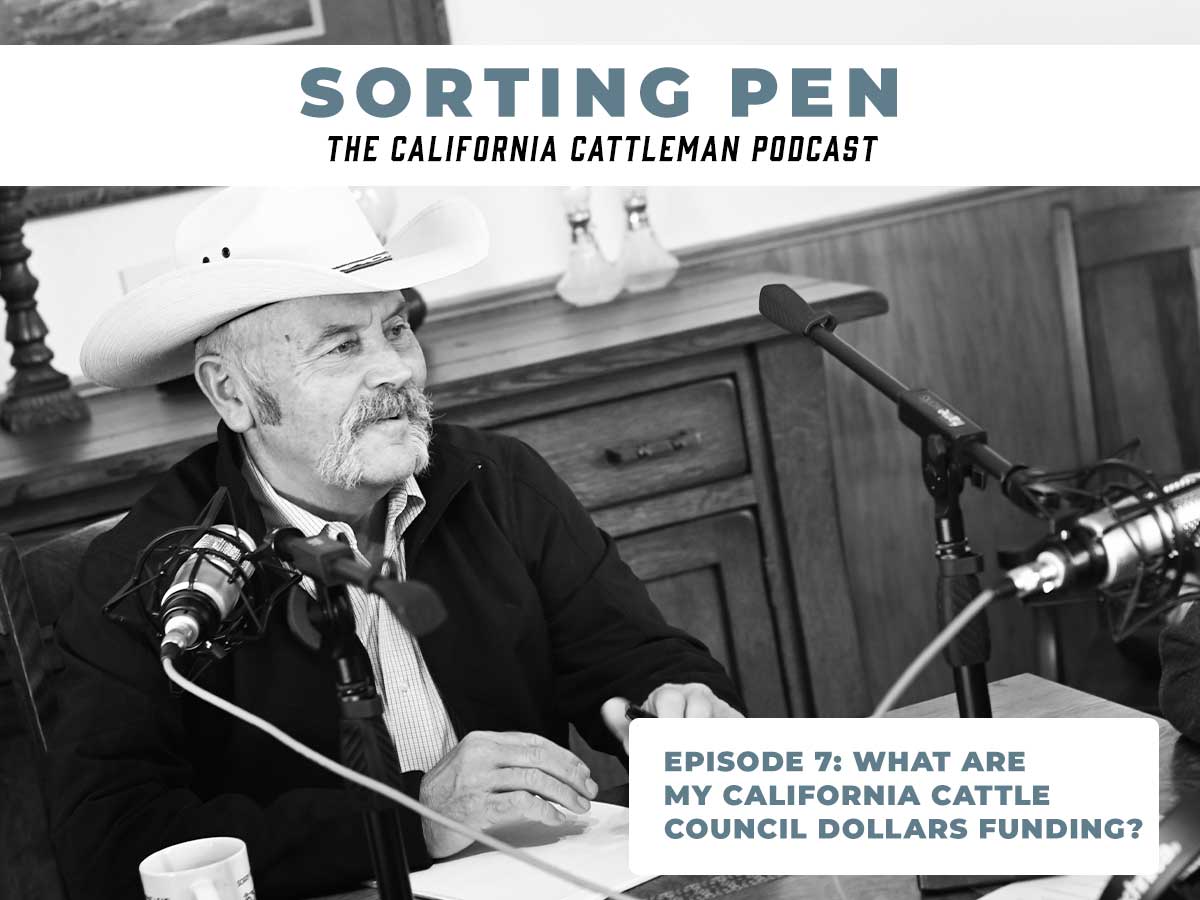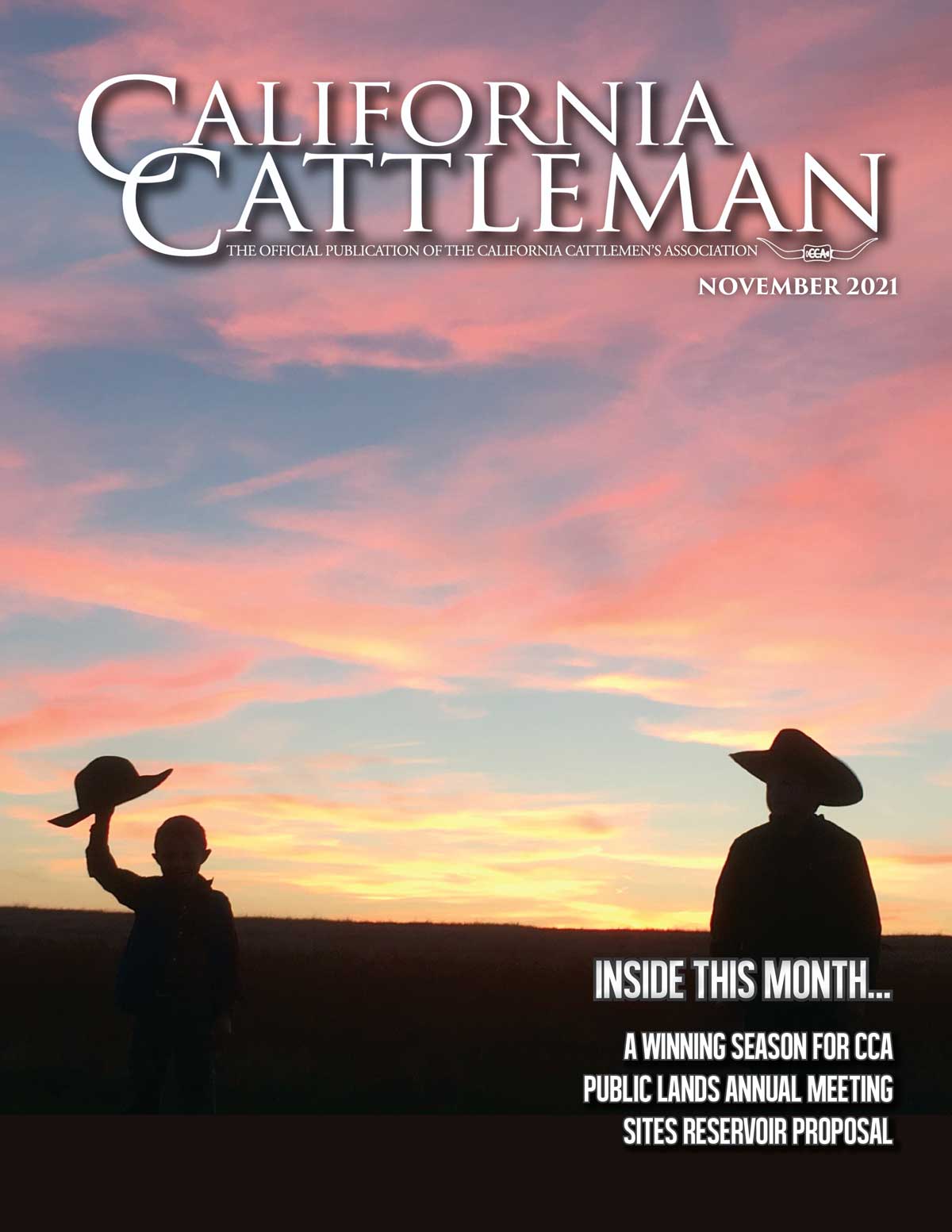
LEGISLATIVE BULLETIN
To read the full version each week, please subscribe below.

Episode 7: What are my California Cattle Council dollars funding?
On this new Sorting Pen: The California Cattleman Podcast episode, California Cattle Council Chairman Dave Daley gives producers an update on where their Council dollars are going and a refresher on how the Council operates. Later in the episode future opportunities for the Council are discussed. To hear the conversation, click here. All episodes are also available on Apple Podcasts, Google Podcasts and Spotify.
NCBA Calls for Suspension of Fresh Beef Imports from Brazil
The National Cattlemen’s Beef Association (NCBA) on Friday submitted a letter to U.S. Department of Agriculture Secretary Tom Vilsack urging the immediate suspension of all fresh beef imports from Brazil.
The request follows two incidents of atypical bovine spongiform encephalopathy (BSE) in Brazil this summer which the nation failed to disclose to the World Organization for Animal Health (OIE) for at least ten weeks. Atypical BSE cases identified on June 11 and June 25 were not reported to OIE until September 3.
While OIE does not explicitly require reporting of atypical BSE cases, most nations immediately report such cases as a matter of transparency, according to NCBA. Because “Brazil’s irresponsible behavior may pose a significant threat to the health and safety of the U.S. cattle herd,” the letter requests that “USDA take immediate action to indefinitely suspend Brazil’s fresh beef access to the U.S. market until USDA conducts a thorough review, including a risk assessment, of Brazil’s…Ministry of Agriculture, Livestock, and Food Supply (MAPA), as well as its veterinary diagnostic laboratory system.”
“NCBA has long expressed concerns about Brazil’s history of failing to report atypical BSE cases in a timely manner, a pattern that stretches back as far as 2012,” said NCBA Vice President of Government Affairs Ethan Lane. “Their poor track record and lack of transparency raises serious doubts about Brazil’s ability to produce cattle and beef at an equivalent level of safety as American producers. If they cannot meet that bar, their product has no place here.”
For more information, see NCBA’s press release here.
Update: President Biden Signs Bipartisan Infrastructure Investment and Jobs Act
This afternoon, President Joe Biden signed into law H.R. 3684, the bipartisan Infrastructure Investment and Jobs Act (H.R. 3684 is the bipartisan hard infrastructure bill, not to be confused with the “Build Back Better Act,” the Democrats’ $1.75 trillion social spending reconciliation bill).
In addition to $127 billion for roads, bridges, ports and waterways, the Infrastructure Investment and Jobs Act contains several wins for cattle producers, including:
- A 150 air-mile exemption to Hours of Service regulations on the back end of livestock hauls. A 150-mile exemption already exists for the front-end of livestock hauls, and the additional back-end exclusion is intended to give haulers additional time to safely navigate rural roads and to ensure animal welfare;
- Broadband internet expansion, including $42.45 billion to states and territories to expand broadband internet infrastructure and $2 billion for the U.S. Department of Agriculture to expand broadband in rural areas;
- Wildfire prevention and suppression. The bill allocates more than $3.3 billion through 2026 to the U.S. Forest Service and Department of the Interior for wildfire prevention and suppression activities, including $500 million for prescribed fires;
- Codification of “One Federal Decision.” Former President Donald Trump’s Executive Order 13807 sought to streamline permitting for major infrastructure projects through a “One Federal Decision” framework which aims to complete environmental review and permitting for major infrastructure projects within two years with one federal agency taking the lead in navigating the project through the regulatory process. H.R. 3684 codifies the One Federal Decision rule, which the National Cattlemen’s Beef Association notes “is valuable for all cattle producers who engage with EPA, the Army Corps of Engineers, and the U.S. Department of Agriculture” because “A government-wide commitment to ensuring uniformity in decision-making drastically increases access to federal programs by saving regulated stakeholders valuable time and resources.”
COMMENTS DUE TODAY: USFS Region 5 Proposes Hazard Tree Removal
On October 25, the U.S. Forest Service’s Pacific Southwest Region (Region 5), which covers virtually all U.S. Forest Service lands in California, announced a proposal for “hazard tree felling and removal, as well as removal of downed woody fuels resulting from hazard trees (slash), to reduce public safety hazards along portions of roads, trails, and near facilities.” The proposed project would be undertaken within the Inyo, Klamath, Lassen, Mendocino, Modoc, Plumas, Sequoia, Shasta-Trinity, Sierra and Six Rivers National Forests.
In recent years, CCA has advocated for Region 5 to take swift action to remove hazard and downed trees which pose significant risk of subsequent wildfire activity (private forest landowners have worked expeditiously to remove downed and hazard trees forest-wide, capturing economic value while reducing subsequent wildfire threats). The California Public Lands Council will fill comments today supporting Region 5’s proposed project and urging the agency to expand the scope of the proposal beyond merely roads, trails and facilities, as the threats from hazard trees exist throughout California’s forests.
The full scoping document for the proposed project is available here, with additional resources available here. CCA encourages grazing permittees within the impacted forests to convey their support for the project. Comments are due today, November 15, and may be submitted online here.
Stories from California Cattle Country Podcast Releases New Episode
Likely Land & Livestock Company in Modoc County is the feature of the latest episode of Stories from California Cattle Country. Fifth generation rancher Myles Flournoy talks about the ranch’s multigenerational history and about Treasure Island which is a boneyard of old ranch vehicles some of which fell victim to Myles and his brother Dan’s creative driving. Their uncle Dave who runs the ranch’s auto shop refers to Treasure Island as his parts department. Listen and see photos from the ranch, including photos of gems from Treasure Island, at http://calcattlecouncil.org/likely.
The episode is also available on a variety of platforms for streaming podcasts. Stories from California Cattle Country is produced by the California Cattlemen’s Foundation with support from the California Cattle Council.
Three Proposed Ballot Initiatives of Note Cleared for Circulation
Earlier this month, three proposed 2022 ballot initiatives previously reported on in the October edition of Hot Irons (“Proposed 2022 Ballot Initiatives May Impact Cattle Producers”) were cleared for circulation by the Secretary of State’s office. Now that the initiatives are cleared for circulation, proponents may begin gathering the signatures necessary to qualify the measured for the November 2022 ballot.
The “Water Infrastructure Funding Act of 2022” would require that 2% of the State’s annual General Fund Revenue – between $2.5 billion to $4 billion per year – be transferred to a “Water Supply Infrastructure Trust Account” to fund water projects until the state’s water supply has increased by 5 million acre-feet.
Initiative 21-0016 – titled “Provides that Local Land-Use and Zoning Laws Override Conflicting State Laws” by the Secretary of State’s office – would enshrine local control in the state Constitution by providing that “in the event of a conflict with state statute,” a city or county regulation regarding “the zoning, development or use of land…shall prevail over” the conflicting state statute.
Finally, the “Repeal the Death Tax Act” – proposed by the Howard Jarvis Taxpayer Association – would roll back certain provisions of 2020’s Proposition 19 relating to intergenerational transfers of real property and provide additional exemptions from property tax reassessment for non-residential real property.
All three initiatives would be amendments to the California Constitution, and thus require signatures equal to 8% of the votes cast in the 2018 Gubernatorial Election – or 997,139 valid signatures from registered voters. The Water Infrastructure Funding Act of 2022 and local land use initiatives must gather these signatures by May 2, 2022 to qualify for the ballot; the Repeal the Death Tax Act must qualify by May 3.
CNRA Extends Deadline for Public Comments on Draft Natural and Working Lands Climate Smart Strategy
Early in October, the California Natural Resources Agency (CNRA) released a public comment draft of its Natural and Working Lands Climate Smart Strategy. The document was mandated by Governor Gavin Newsom’s Oct. 7, 2020 Executive Order which also initiated the state’s “30×30” initiative – the goal of conserving 30% of the state’s land and waters by 2030 in an effort to preserve species diversity and slow climate change. CNRA recently announced the deadline for public comments has been extended to November 24.
As detailed in previous editions of Legislative Bulletin, CCA encourages members to submit comments on the draft strategy by selecting “How to Provide Input on the Draft Natural and Working Lands Climate Smart Strategy” here. For further information, contact Victoria Rodriguez at the California Cattlemen’s Foundation at victoria@calcattle.org.
Upcoming CCA Events
105th Annual CCA/CCW Convention and California Cattle Industry Tradeshow
December 1-3, Peppermill Reno
Only two weeks until convention! Register today and find out who is speaking at https://calcattlemen.org/convention2021. Reserve your room at the Peppermill today by calling 1-866-821-9996 or by clicking here.
Upcoming CCA Events
Cattle Industry Convention & NCBA Trade Show
February 1-3, Houston
The Cattle Industry Convention & NCBA Trade Show is heading to Houston, Texas in February and one California kid aspires to sing the National Anthem at this year’s event! Ward Hafenfeld of Weldon is one of four National Anthem finalists competing to sing and he needs your votes. Click here to vote for Ward and see a video of him singing. You can vote once a day until voting closes on Friday. Good luck, Ward!
CCA in the News
Beef prices soar as farmers struggle to feed their cattle NBC Nightly News CCA President Tony Toso and Turlock Livestock Auction Yard, Inc. Owner Max Olvera were included in a NBC Nightly News story that aired on Saturday about why beef prices are high. To watch it, click here.
Industry News
California’s wildfire insurance crisis is easing. Why some carriers are returning The Sacramento Bee “Armed with higher rates — and better information about the risks from mega-fires — they’re beginning to underwrite policies in areas they’d been abandoning. While the state-run insurance pool, the California FAIR Plan, is still taking on new customers, its rate of growth is slowing down.” To continue reading, click here.
Prescribed burns are key to reducing wildfire risk, but federal agencies are lagging Los Angeles Times “In total, the Forest Service had, as of Sept. 17, met about 54% of its goal of treating 238,200 acres in the state during the fiscal year, which ended Sept. 30. The target does not discriminate between prescribed burning and other methods of vegetation removal. Those include grazing, thinning, chemical treatments such as herbicide, and disposing of the thinned vegetation, including biomass removal, chipping, crushing and piling.” To continue reading, click here.
Jerry Brown focuses on saving California forests from fires AP News “As smoke lingered in the air amid another destructive California wildfire season, former Gov. Jerry Brown invited a group to his ranch for an urgent conversation: What more could be done to save California’s forests from wildfires?” To continue reading, click here.
Cal Fire chief to retire in December after leading agency through record wildfire seasons CapRadio “Cal Fire Chief Thom Porter will retire before the end of the year, after leading the state through two of its worst wildfire seasons on record.” To continue reading, click here.
New Episode of Sorting Pen: The California Cattleman Podcast
California Cattle Council Chairman Dave Daley gives producers an update on where their Council dollars are going and a refresher on how the Council operates. Later in the episode future opportunities for the Council are discussed. To hear the conversation, click here.



